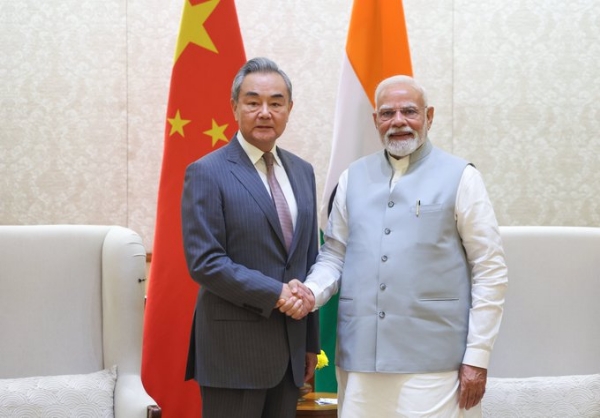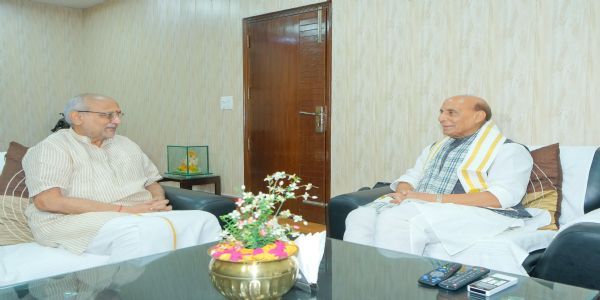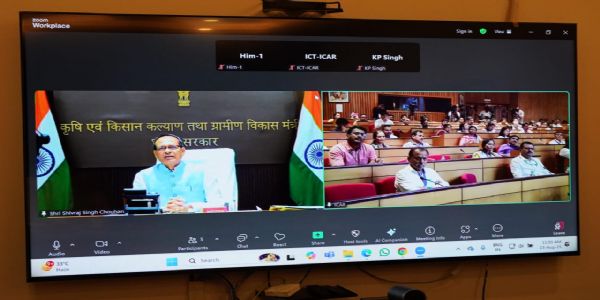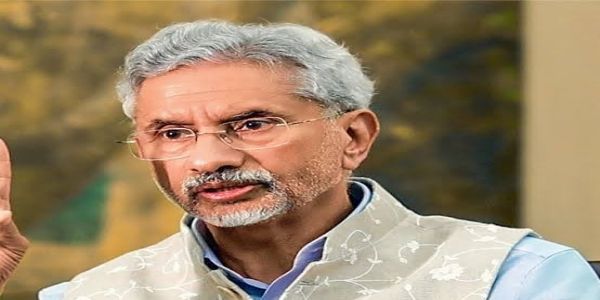
Delhi, 19 August (HS):
In a pivotal development signaling progress in diplomatic ties, Prime Minister Narendra Modi hosted Chinese Foreign Minister Wang Yi at his official residence, 7 Lok Kalyan Marg, on Monday. This high-profile meeting comes amidst a backdrop of efforts to thaw the tensions that have lingered since the 2020 border standoff in eastern Ladakh, marking a renewed commitment by both nations toward constructive engagement.
In a post on X,PM wrote,Glad to meet Foreign Minister Wang Yi. Since my meeting with President Xi in Kazan last year, India-China relations have made steady progress guided by respect for each other's interests and sensitivities. I look forward to our next meeting in Tianjin on the sidelines of the SCO Summit. Stable, predictable, constructive ties between India and China will contribute significantly to regional as well as global peace and prosperity
Foreign Minister Wang Yi, also a member of the Communist Party’s Politburo, conveyed a message and extended an official invitation from President Xi Jinping to Prime Minister Modi for the upcoming Shanghai Cooperation Organisation (SCO) Summit scheduled to be held in Tianjin. Wang Yi spoke positively of the recent diplomatic engagements, including his discussions with India’s External Affairs Minister Dr. S. Jaishankar and the 24th round of the Special Representatives’ talks on the boundary issue, co-chaired by National Security Advisor Ajit Doval.
In response, PM Modi expressed his satisfaction with the “steady and positive progress” witnessed in bilateral relations since his landmark meeting with President Xi in Kazan last year. Highlighting the principles of mutual respect, mutual interest, and mutual sensitivity as guiding beacons, PM Modi underscored the importance of peace and tranquillity along the border, reiterating India’s unwavering commitment to a “fair, reasonable and mutually acceptable resolution” of the boundary dispute.
Welcoming the resumption of the iconic Kailash Mansarovar Yatra as a symbol of revived people-to-people ties, Modi thanked President Xi for the SCO Summit invitation and formally accepted it, expressing eagerness to meet President Xi and other dignitaries in Tianjin. He emphasized that stable, predictable, and constructive bilateral ties between India and China hold the key to enhanced regional stability and broader global peace and prosperity.
Earlier in the day, National Security Advisor Ajit Doval described the ongoing border situation as “stable and improving,” underscoring an “upward trend” in relations characterized by relatively peaceful border conditions and deepened diplomatic dialogues. Both sides acknowledged the critical importance of economic cooperation, with China offering support in areas crucial to India’s development such as rare earth minerals, fertilizers, and infrastructure technology.
External Affairs Minister S. Jaishankar, in his discussions with Wang Yi, advocated for a candid and constructive approach rooted in the “three mutuals” — mutual respect, sensitivity, and interest — cautioning that differences must not escalate into disputes, nor should competition devolve into conflict.
This carefully orchestrated diplomatic engagement, described by officials as pragmatic and forward-looking, reflects a cautious yet hopeful thaw in India-China relations. Both nations appear committed to nurturing a dialogue-driven partnership, reducing tensions, and building a foundation for long-term cooperation that serves not only their national interests but also contributes substantially to regional and global peace.
The meeting between PM Modi and Wang Yi thus marks a significant milestone in a relationship poised for a more positive trajectory after years of challenges, signaling a fresh chapter of collaboration and strategic stability.
---------------
Hindusthan Samachar / Jun Sarkar








